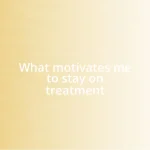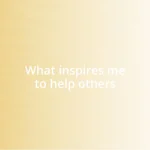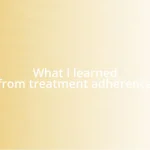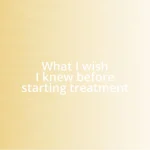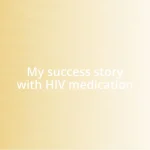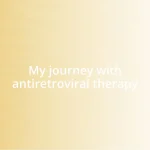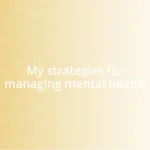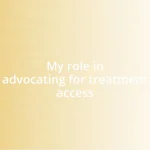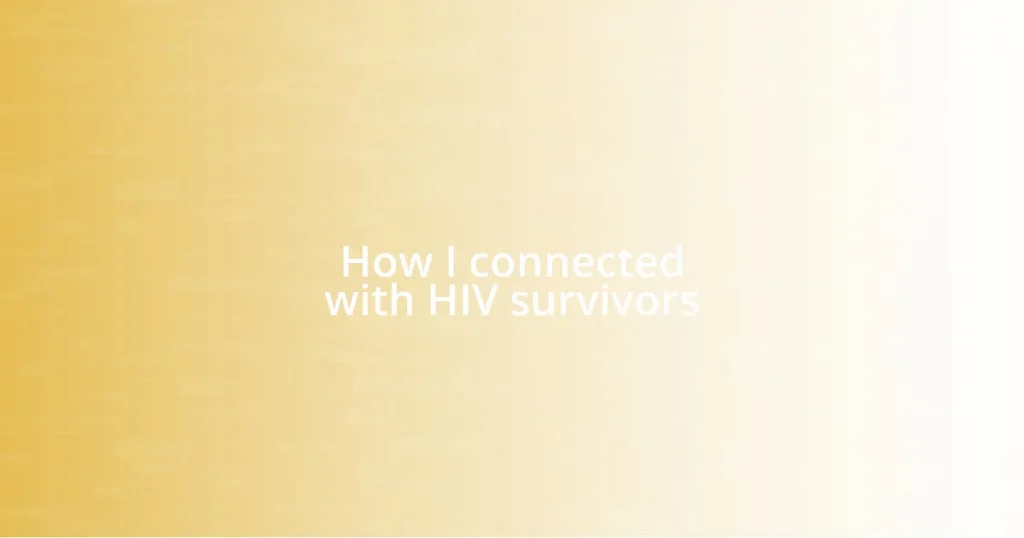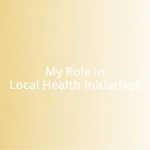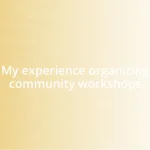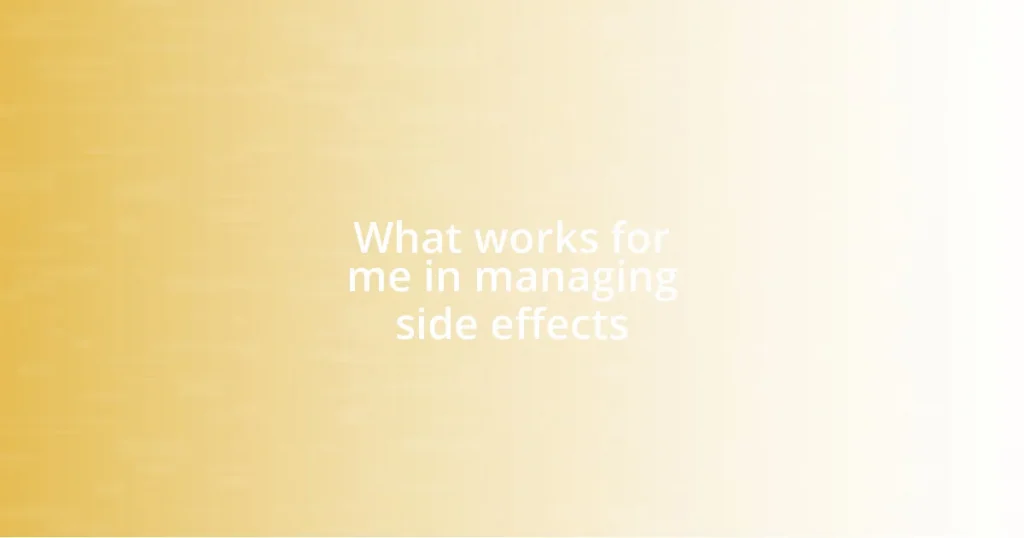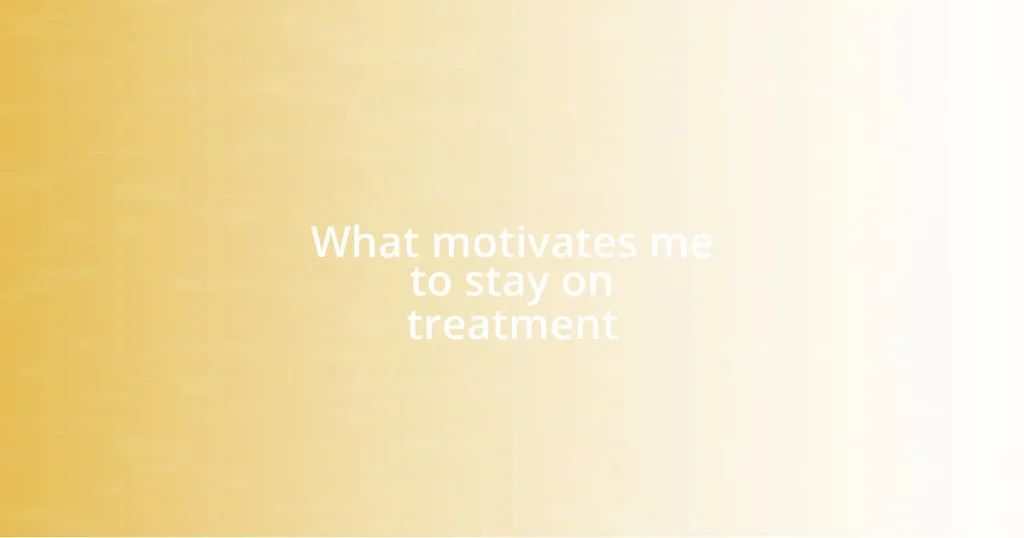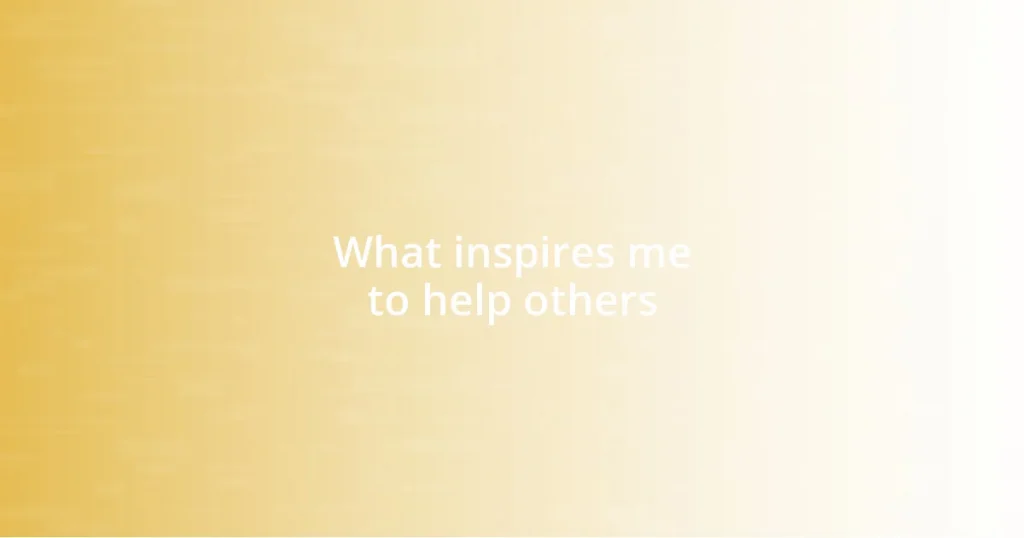Key takeaways:
- HIV impacts not only physical health but also mental, emotional, and social well-being, highlighting the importance of community support.
- Connection among HIV survivors fosters understanding, healing, and resilience through shared experiences and open dialogue.
- Local support groups provide essential emotional and practical assistance, adapting to individual needs and experiences.
- Taking action for change and advocating for HIV awareness can reshape perceptions and empower individuals and communities.

Understanding HIV and Its Impact
HIV, or Human Immunodeficiency Virus, is a condition that affects not just an individual’s physical health, but also their mental and emotional well-being. When I first connected with HIV survivors, I was struck by the weight of their stories—how a diagnosis can reshuffle someone’s entire life, impacting relationships, careers, and even aspirations. Can you imagine living with the stigma that often surrounds this virus? It’s a reality that many face daily.
The impact of HIV extends beyond the medical realm; it profoundly influences social dynamics and quality of life. I remember listening to one survivor describe how they felt isolated from friends and family after their diagnosis, illustrating the painful social consequences that can accompany an HIV-positive status. This disconnect made me reflect on the importance of community support—what if everyone faced such a life-altering challenge?
Understanding HIV means acknowledging its history and evolution over the decades—a journey marked by fear, loss, and resilience. I find it heartening that there is now effective treatment that allows many living with HIV to lead normal lives, yet the emotional scars from the past linger. How can we foster a society that supports those affected, rather than ostracizes them? To me, bridging that gap is essential for healing, both for individuals and the community as a whole.

The Importance of Connection
Connection is vital for anyone navigating the complexities of living with HIV. As I spoke with survivors, I realized that sharing their experiences built a bridge of understanding and compassion. It was moving to hear how being part of a community provided a safe haven for expressing vulnerabilities and triumphs—the space where emotions flowed freely had therapeutic power.
- Feeling understood reduces isolation.
- Shared experiences foster healing.
- Building relationships creates support networks.
- Open dialogue combats stigma.
- Connection can empower both individuals and communities.
In my encounters, I often found that laughter intertwined with tears, revealing the depth of resilience that participants demonstrated. One survivor shared a vivid memory of bonding with others in support groups, where their collective stories transformed from pain into strength. It reaffirmed my belief that connection doesn’t just help, it heals, nurturing the spirit and igniting hope for a brighter future.

Finding Local Support Groups
Finding local support groups for HIV survivors can enrich the journey of those affected in profound ways. I vividly recall my first attempt at locating a support group in my city. Initially, I felt lost and unsure where to start, but my determination led me to community health centers, and online resources specifically tailored to HIV support. It was like embarking on a treasure hunt—where each lead brought me closer to finding a supportive community.
The diversity of support groups available surprised me—some focused on emotions, while others tackled practical issues like healthcare navigation. I remember attending a group meeting where members openly discussed their struggles and victories. The solidarity felt palpable and reminded me of how powerful a community can be for healing. Wouldn’t you agree that having a safe space to share your story can lighten the emotional load?
I also learned that local libraries and LGBT centers often collaborate with organizations to host support sessions. It’s fascinating how these spaces can be a refuge for many, creating an atmosphere of acceptance and understanding. I still reflect on two distinct groups I attended: one met weekly and fostered deep connections, while another was more casual, allowing for lighter conversations. Both experiences enriched my understanding of the community, showing me that the right group can adapt to individual needs.
| Type of Support Group | Focus |
|---|---|
| Weekly Group Therapy | Emotional support and shared experiences |
| Casual Meetups | Social connection and lighter topics |
| Health Education Workshops | Information on navigating healthcare systems |
| Peer Support Networks | One-on-one support and mentorship |

Sharing Personal Stories
When I engaged with HIV survivors, it struck me just how impactful their personal stories could be. One participant recounted the moment they found the strength to share their diagnosis with their family. The fear in their voice was palpable, but so was the relief when they noticed acceptance and understanding emerge. Hearing such raw vulnerability made me wonder: how many other families could move from fear to acceptance through open, honest conversations?
A vivid memory that lingers with me is a storytelling session at a retreat for survivors. Each person took turns sharing their journey, and the room was filled with an extraordinary mix of tears, laughter, and empathy. I felt the air shift dramatically as each story unfolded—heavy burdens were transformed into relatable experiences that forged unbreakable bonds. It was as if we were weaving together a tapestry of hope, showing that vulnerability is not a sign of weakness but a path to healing.
Reflecting on these experiences, I realize that our stories not only empower us individually but also serve as beacons for others. I often ask myself: what if someone out there hears my story and feels inspired to share theirs? It’s a beautiful thought, and it fuels my passion for fostering dialogue among individuals. When we share our stories, we create a safe space for others to step forward, and that, in itself, becomes a powerful act of courage and solidarity.

Listening to Survivor Experiences
Listening deeply to the experiences of HIV survivors has a unique power that goes beyond mere storytelling. One evening, as I sat in a circle listening to a survivor recount their journey, I was struck by the way their voice quivered with emotion. It reminded me that beneath the surface of every narrative lies a world of pain, resilience, and hope. How often do we truly take the time to listen, absorbing each word and the strength behind it?
In another instance, I remember a session where individuals shared how they coped with stigma. The stories were heart-wrenching yet inspiring. One person described feeling judged in public spaces yet found solace in the shared understanding within the group. It made me realize the importance of validating our feelings. Isn’t it remarkable how sharing our burdens can lighten the load and foster a sense of community?
The act of listening, I’ve found, can be incredibly transformative for both the speaker and the listener. When I absorbed their stories, I didn’t just hear their words; I felt their struggles echoing in my heart. I learn as much from their triumphs as from their challenges. Each time a survivor spoke, it felt like a call to action for me—to be more compassionate and present. Listening fosters not only understanding but also a profound connection that transcends words.

Building a Support Network
Building a support network is essential for anyone navigating the complexities of living with HIV. I recall my first meeting in a community center, where individuals shared not only their stories but laughter and companionship. That evening, I felt a wave of reassurance, realizing I wasn’t alone in my journey. It made me think—how many others find comfort and strength in such connections?
During one group session, we briefly broke into smaller circles. I remember bonding with a fellow participant over our shared experiences; we exchanged phone numbers, and it felt like I had found a lifeline. This simple act highlighted the power of connection—it’s not just about talking; it’s about building relationships that uplift and empower us. Isn’t it amazing how one conversation can blossom into lasting friendship and support?
In my experience, supporting each other goes beyond just sharing struggles; it’s about celebrating victories, too. I vividly remember the day a friend announced their undetectable status. The room erupted in cheers and tears. That moment underscored something profound for me: when we gather, not just as individuals but as a network, we create a sanctuary where everyone can thrive. How often do we take the time to cultivate that kind of nurturing environment in our lives?

Taking Action for Change
Taking action for change is not just about awareness; it’s about stepping into the arena and advocating for the rights and dignity of HIV survivors. I recall joining a local advocacy group, motivated by what I heard from survivors. It was one of those moments when passion ignited purpose, and I realized that my voice could contribute to something bigger—how powerful is that realization?
One particularly inspiring day, we organized a rally to raise awareness about HIV stigma. I stood among survivors and allies, holding up a sign that read, “We Are Not Our Status.” The energy was electric. Seeing people from all walks of life come together, united by a shared purpose, left me feeling hopeful. I often think: isn’t our collective action essential in changing perceptions and breaking down barriers?
Through my advocacy journey, I’ve learned that every small action counts. Each conversation about HIV, whether in a coffee shop or a community meeting, has the potential to reshape attitudes. I remember chatting with someone who held persistent misconceptions. Instead of confronting them, I chose to share a survivor’s story—a simple yet profound choice. And sometimes, I wonder, could a single story change someone’s perspective forever? In these moments, it becomes clearer than ever to me that taking action begins with intentional dialogue and a willingness to learn.

